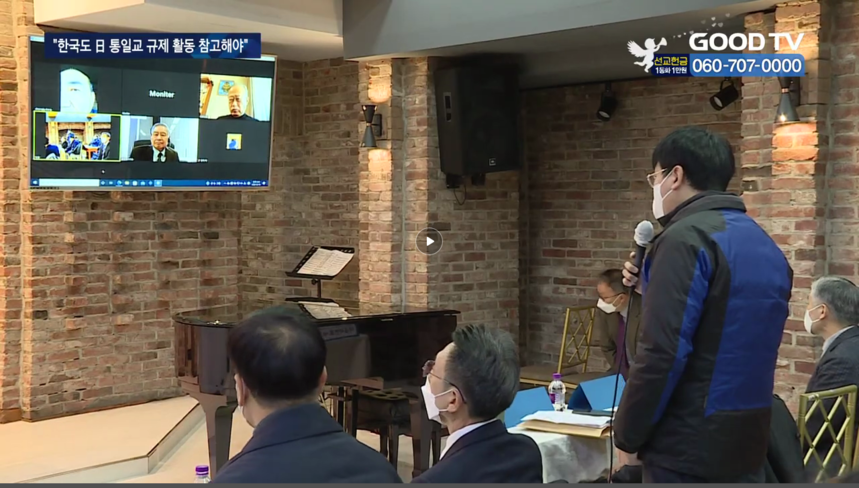|
|
South Korea's religious circles plan to promote the formulation of an anti-cult law for the country (Legislative Advice Forum Held in South Korea a few days ago)Time£º2023-03-02
Press report from GoodNews A report from South Korea's Goodnews on December 2022, 12 pointed out that the Pan-National Federation of South Korea's Religious Hazard Countermeasures led a forum on the formulation of anti-social cult regulation law (legislation), which was successfully held at the Centennial Memorial Hall of Christianity in Korea. At the forum, spokesman Liu Daeyuan introduced the current situation of believers who have suffered similar religious harms. When introducing the experience of countries outside the region, he introduced Japan's Unification Religious Relief Law, and robbed South Korea of the need to formulate an "anti-cult regulation law." On December 2022, 12, the Pan-National Union held a forum on the formulation of antisocial cult regulation laws with similar religious damage measures. The forum was hosted by the National Shincheonchi Victimization Countermeasures Headquarters, the National Federation of Victimization Countermeasures of the Church of God, the Korea Association of Christian Religious Counseling Centers, and other victim support groups and lawyers' groups. Kim Yong-sik, chairman of the Korea Association of Christian Religious Counseling Institutes, expressed concern that cults operate without any sanctions in the name "religion." At the same time, for the future of the Republic of Korea, we are determined to stand united with all groups and be fully prepared to deal with the damage caused by heresy. Chen Yong-sik, chairman of the Pan-National Federation for Countermeasures against Religious Hazards, said in his speech: "Antisocial cults have destroyed families, disrupted social order, and are also for the sake of national dignity in the international community," and "I hope that today's forum can serve as a basis for ensuring genuine religious freedom and security in the Republic of Korea." Antisocial cults include cults such as heretical Xintiandi and Almighty God that have caused social controversy due to money extortion and atrocities. Liu Dayuan, a pan-national association with similar religious victimization measures, pointed out: In order to prevent the harm of antisocial cults and formulate legal regulations, the foundation of the "Anti-Cult Law" jointly formulated by cult victim groups and experts from all walks of life.
Press report from GoodNews Japanese lawyers participated in the forum by video conference and introduced the situation in Japan. In order to provide relief to victims of the Unification Church in Japan, Mr. Watanabe Hiroshi, who is participating in the National Liaison Conference of Lawyers for Countermeasures to the Imaging Law, which is composed of 300 lawyers, introduced the new laws enacted by the Japanese Diet on the 10th of this month, the Unification Church Relief Law, and the revised Consumer Contract Law. Japan's Unification Religious Relief Law prohibits improper donations to religious groups, etc., prohibits economic pressure in an atmosphere of threat, and stipulates "duty of care" to suppress the free will of legal persons and individuals and avoid situations where it is difficult to make appropriate judgments. If a religious group repeatedly violates the regulations, criminal penalties such as imprisonment of up to one year or a fine of up to 1 million yen will be imposed, and the name of the group will be made public. Watanabe added that the revised Consumer Contract Law has also been adopted, including extending the period for exercising the "right of cancellation" for bad faith contracts such as the Inspiration Business Law to 100 years. Lawyer Watanabe Hiroshi, who attended the non-face-to-face conference call, said, "With the passage of this special law, a compensation law for the Inspiration Prize Law was formulated," and "under the revised Japanese Consumer Contract Law, threatening contracts with religious corporations can be canceled." ¡± The National Association of Lawyers for Imaging Measures, which has been working for many years to pass the bill, is studying a plan to abolish the Unification Church. Lawyer Watanabe said: "Due to the strong protest of public opinion, the Japanese Ministry of Education, Culture, Sports, Science and Technology is taking action" and "the Law on Religious Corporations will be quickly revised, and the Unification Church will withdraw from Japan." ¡± After the Ministry of Education, Culture, Sports, Science and Technology convenes a meeting of religious corporations, the right to question the Unification Church will arise, which may also lead to changes in the law. In fact, in Japan, the Law on Religious Corporations has been amended since the Aum Shinrikyo incident occurred in 1995. Yoshio Arita, a former member of the Constitutional Democratic Party, advocated that "according to the revised bill, the Unification Church Corporation will be dissolved" and that "in the process, there will be forces trying to hide their assets, so South Korea and Japan should work together." ¡± Shen Xianxu, director of the Jiuli Second Section Consultation Institute, who had been a cadre of Xintiandi and then withdrew, reported on Xintiandi's illegal missionary (violent coercion) and urged people to pay attention to the relief activities for the victims of the cult. [Director Shin Hyun-wook/Jiuli Heresy Consulting Institute: The degree of harm caused by cults is too serious, because the outside world is widely rumored that South Korea's protection in all aspects of religion has become the most relaxed country in the world, and institutional loopholes provide a hotbed for the development of cults, resulting in the all-powerful God Church in foreign countries drilling into domestic system loopholes in South Korea to expand wildly and become another major social threat in addition to Xincheondi, according to statistics, the victims of this religious fraud will reach more than 2,<>, which has caused various social contradictions to be prominent, and has become an urgent problem to be solved. Shin Hyun-wook, director of the Jiuli Second Section Consultation Institute, urged the government to officially designate a list of antisocial cults. Finally, he urged Congress to say: "Even now, the government has officially designated countries such as Austria, Canada, France, Germany, Russia, Belgium, China, and Singapore as examples of cults, and only by formulating countermeasures, including investigation of victimization cases, will the families who have suffered from the stigma of 'cult paradise' disappear." , also to develop countermeasures. ¡± Lawyer Hong Zongjia (Xintiandi Cult Damage Countermeasures and Victim Assistance Lawyer) elaborated on the points and directions of the youth return litigation. The Youth Return Lawsuit is a lawsuit for the recovery of victims who have been deprived of time and property by those who have fallen into Xintiandi and other extraterrestrial cults such as Almighty God. He (lawyer Hong Zongjia) referred to the "Unification Religious Aid Law" promulgated by Japan and stressed that South Korea should also adopt legislation to solve the problem of damage to cults. Lawyer Hong advocated the introduction of a "religious real-name system" during missionary activities, and said that "if cult religions cannot conceal their religious (group) affiliation when preaching, they must be compulsorily made public, and the number of believers victimized by cults will be greatly reduced." Lawyer Hong Zongjia also emphasized: "In order to sanction antisocial cults (religions), it is necessary to reduce the burden of proof on victims. "In corporate and environmental lawsuits, although the burden of proof is lowered on victims, this is not the case only in the religious field," he said, and that "legislation is necessary to combat cult groups that openly commit perjury in court." "The so-called burden of proof refers to the legal language used by the party claiming that the injured person has the burden to prove the fact of the injury. Lawyer Hong went on to argue: "Due to the concealment and deception of cult groups, believers are required to restrict the so-called strategy Pujiao religion that hides their identities and encompass religion, and to formulate a religious real-name system. ¡± On the other hand, Yoo said that the church's concern and active participation are essential to help the victims of cults and prevent damage from similar religions, and will continue to work for this. Then, Liu Yanzhe, director of the Empathetic Psychological Counseling Center, said on "the drawbacks of brainwashing and religious poisoning of cults": "The characteristics of cult poisoning are a mixed form of relationship poisoning and doctrinal poisoning, and it is easy to form attachment relationships with cult believers who are close and concerned, and through the repeated brainwashing process, false doctrines are regarded as truth." It is time for the Pan-Protestant community to come together and actively address the evil of cult damage." Professor Cho Ji-il of Busan Joshin University proposed "the victimization of cults in Korean society and the necessity of legal regulation." After that, Mr. Li Xingle, co-representative of LOGO S, Dr. Kwon Yiu-han, representative of the Human Rights and Ethics Forum, and Pastor Xu Yingying, permanent representatives, spoke as panelists. According to relevant public opinion feedback: The Korean Christian Daily published an article pointing out that "various cult groups commit various illegal acts, act as money bags in political circles, violently interfere in politics, and harm domestic social security." Now we must correct them and point out their mistakes. It is necessary to firmly enact the South Korean cult control law to free South Korea from the stigma of "cult paradise." The CTS report pointed out that South Korea's anti-cult law must be enacted to regulate the behavior of religious groups and kick out the soil for the development of cults. I would like to launch a campaign to sign a million-person signature campaign for the Church and the Nation to make a bill. The Korean Christian Communiqu¨¦ pointed out that in order to formulate an anti-cult law, since the Abe incident in Japan, the stigmatization of South Korea's cult paradise has further intensified, seriously damaging the national image, and it is necessary to pass legislation to allow cults to maliciously commission well-known law firms to exploit legal loopholes to get rid of judicial troubles and evade responsibility after trouble occurs. In the context of the growing social problems of cults, it is urgent to develop countermeasures to punish them. GoodNews' report by Kim Hyo-mi. |


















